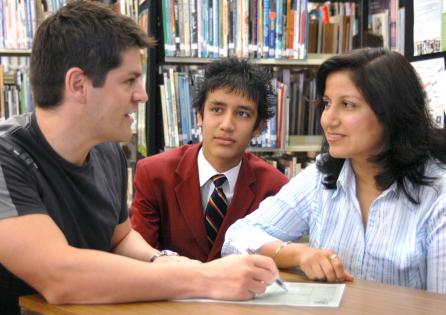It’s funny isn’t it? I have done so many of these – parent-teacher interviews – that I think nothing of it, but the Motherpedia editor has asked me to write something about them as she thinks readers might be interested. So here goes.
Parent-teacher interviews are for you and your child. They offer an opportunity to find out how your child is performing in school and also to build a relationship with his or her teachers. Those few minutes will set the stage for future conversations and action items that you, your child and her teacher can work on together to ensure a successful year.
1. Be prepared. Please – don’t just turn up harassed and hurried from work without thinking about what you’re doing. I happen to think education is the most important thing you can do for your child so it’s important you take these parent-teacher interviews seriously. Believe it or not, we prepare for it so you should too. Ask your child if there is anything he/she wants you to bring up with the teacher, and think about any questions or concerns you have for the teacher when it comes to your child’s progress and behaviour in the classroom. Write it down (or put it in the Notes section of your iPad!). Not only will you engage in a deeper conversation with the teacher, but you won’t leave feeling like you forgot something.
2. Be on time. The ‘window’ for parent-teacher interviews is generally pretty tight with parents scheduled every 10-20 minutes depending on school policy. Please remember that you may only have one or maybe two or three of these – depending on where and what we teach, we could have many! For example, I currently have around 150 students to report on. By the time you see me - for about ten minutes - I've done a lot of preparation and I've also got to remember who's who amongst all those students. That’s not going to be the case in primary schools but it is commonplace in secondary schools. Respect your time and the teacher’s by setting reminders and making sure you are on time. Be willing to schedule a follow-up meeting to discuss improvement strategies you may implement. If you absolutely can’t make it face-to-face, ask your teacher for another time.
3. Ask for examples. When talking about your child’s performance, ask the teacher for specific examples of what your child does well and what she could work on. Most teachers will be prepared with work samples to guide your conversation. Also ask teachers how your child gets along with other children and adults at school.
4. Be prepared for honest feedback. Be prepared to hear both positive feedback as well as feedback for improvement. If the teacher identifies specific skills your child can work on, ask for suggestions and recommendations to help close gaps. Are there creative ways to encourage your child’s reading? Can he or she follow a more effective homework system? What educational apps and games will help reinforce classroom learning? Is there anything more you can do?
5. Participate. Parent involvement is important to student success. This doesn’t mean doing their homework, but it does mean being interested in their school and their education. Can you help on sports days? Can you volunteer for the canteen? Are you an expert in something where you could give a special class? Are you a musician, artist, professional sportsperson, event organiser? Don’t be shy about exploring opportunities for volunteering at school. If your busy schedule keeps you from participating as much as you’d like, ask the teacher if you can contribute or volunteer from home.
6. Thank you goes a long way. This may sound self-serving, but please thank the teacher for their time and hard work with your child. You may think we get paid to be there – and we do – but it’s not an awful lot by comparison with some parents. More importantly, it keeps the door open for future communication.








 Agree (0)
Agree (0) Disagree (
Disagree (









__small.png)










